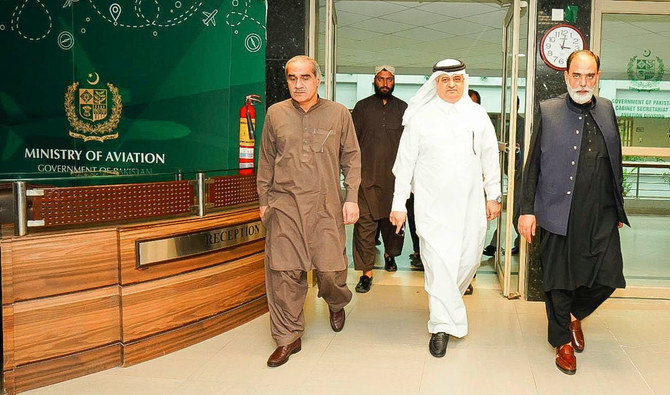ISLAMABAD: Pakistan’s religious affairs minister Senator Talha Mehmood on Friday held a meeting with the country’s aviation minister to discuss the provision of better facilities for Pakistani pilgrims traveling to Saudi Arabia for Hajj this year, said an official statement.
This kingdom reinstated Pakistan’s pre-pandemic Hajj quota of 179,210 pilgrims and scrapped the upper age limit of 65 in January. About 80,000 Pakistanis are expected to perform the pilgrimage under the government scheme this year while the rest will be facilitated by private tour operators.
The first batch of Pakistani pilgrims arrived in the holy city of Madinah on May 22, while the last flight would depart from Pakistan on June 20. According to the religious affairs ministry, these pilgrims will depart for Makkah after spending about eight days in Madinah.
“Federal Minister for Religious Affairs Senator Talha Mehmood, along with Saudi Arabia’s Ambassador to Pakistan Nawaf bin Saeed Al-Maliki, held a meeting with the Federal Aviation Minister Khawaja Saad Rafiq on Friday,” said the statement issued by the religious affairs ministry.
“Consultations were held regarding the difficulties faced by Pakistani pilgrims during their air travel to Saudi Arabia, while a discussion on [ways] to provide better facilities to the pilgrims was also held.”
According to the state-owned Associated Press of Pakistan (APP) news agency, the Pakistani aviation minister informed about the current facilities available to pilgrims while proposing enhancements to further improve their experience.
“He highlighted the importance of coordination between the two countries to ensure the successful implementation of these improvements,” the APP added.
Meanwhile, a private company that helps the kingdom’s mission in Pakistan by providing visa management facility on its behalf announced on Friday it had extended its operations to facilitate Hajj applicants with biometrics.
“Gerry’s Saudi Visa extends operations this weekend, on May 27th and 28th, from 9:00 am to 5:00 pm, to facilitate the completion of [pilgrims’] biometric applications,” it said in a notification.
Hajj is an obligatory religious ritual for adult Muslims who are physically and financially capable of carrying it out. It involves visiting the holy cities of Makkah and Madinah at least once in a lifetime and takes place during the last month of the lunar Islamic calendar called Dhu Al-Hijjah.



















